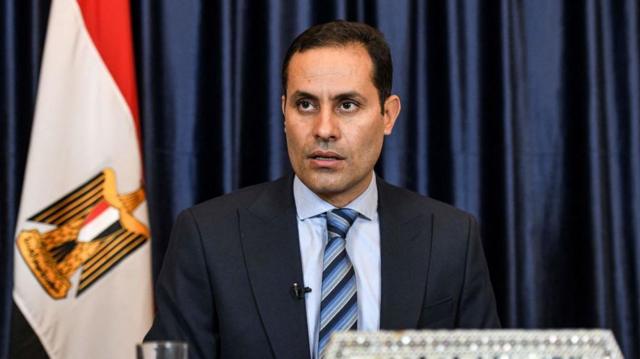
image source, AFP
The Egyptian authorities arrested the political oppositionist, Ahmed Al-Tantawi, after his one-year prison sentence was upheld in the case known in the media as the “Popular Agencies” case.
This was announced by human rights lawyer, Khaled Ali, and Egyptian media, noting that Al-Tantawi and his election campaign manager, Muhammad Abu Al-Diyar, were arrested at the court headquarters.
The Egyptian Commission for Rights and Freedoms said in a post on the X platform: “Court security has kept Tantawi in custody since the beginning of the session.”
On Monday, an Egyptian court upheld the imprisonment of Al-Tantawi, his campaign manager for the last presidential elections, Muhammad Abu Al-Diyar, and 21 members of his electoral campaign, on charges of incitement and assistance in the crime of “printing and circulating electoral process papers without permission from the competent authority.”
Last February, the Matareya Misdemeanor Court had sentenced Al-Tantawi to one year in prison with labor and a bail of twenty thousand pounds to temporarily suspend the implementation of the sentence, while depriving him of running in parliamentary elections for a period of five years from the date of the final ruling, according to lawyer Khaled Ali.
The former parliamentarian was referred to criminal trial last year, on charges of circulating papers related to the elections without the permission of the authorities, after it was announced that he did not meet the conditions for running in the last presidential elections in Egypt.
“Prevent and restrict”
Ahmed Al-Tantawi said that he was subjected to restrictions that prevented him from collecting the powers of attorney required to run in the presidential elections, which was denied by the National Elections Authority. The matter ended with Tantawi being unable to fulfill his powers of attorney and withdrawing from the presidential race.
During the election campaign, Tantawi and his supporters complained that they were prevented from issuing the required powers of attorney authenticated by the Real Estate Registry Authority (one of the agencies of the Ministry of Justice), in which citizens declare their support for Tantawi’s candidacy, so he then resorted to what was known as popular powers of attorney, which are powers of attorney from citizens that are not authenticated by the Public Authority. Real estate.
On the other hand, the Ministry of Interior announced on October 9 that it had arrested a number of people in various governorates while “writing forged powers of attorney for a potential candidate for the presidential elections,” after investigations revealed that the arrested defendants had put signatures on the powers claiming that they were issued by real estate registration offices. “.
The Egyptian authorities had set difficult conditions for running in the presidential elections, and only Egyptian President Abdel Fattah al-Sisi – who actually won those elections and obtained a new presidential term – and a number of candidates who the opposition says “ran in the elections with the approval and support of the authorities because they do not constitute a competitor.” Real for President Sisi.
While Egyptian human rights activists and opponents consider the trial of Al-Tantawi politically motivated and a punishment for his candidacy attempt and his harsh criticism of President Sisi’s policies, the regime and its supporters say it is a purely criminal trial.
